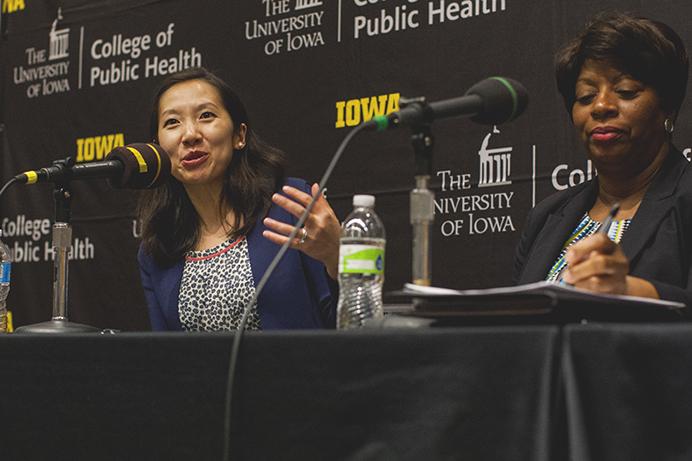By Emi Bendler
[email protected]
Violence and health were brought together in a conversation Tuesday night.
Dozens of people piled inside Callahan Auditorium in the University of Iowa College of Public Health Building to hold a discussion on solutions related to violence. Iowa Public Radio host Ben Kieffer moderated the event.
Special guest Leana Wen, the Baltimore health commissioner and the UI College of Public Health’s Hansen Award recipient, spoke about her study and experiences. The panel also consisted of three others who study violence in relation to public health.
Kieffer started the conversation by highlighting the increase in gun violence in Iowa in the past few years. According to the Center for American Progress, 1,976 people were killed by guns in Iowa from 2001 to 2010.
Wen then shared her experiences with violence as a health professional in Baltimore.
“As an emergency physician, I have to say unequivocally that violence is a health issue,” she said.
She said it is scientifically proven that violence is a contagious disease. It spreads from person to person, and there are ways to prevent and cure it.
To address the issue of violence, she said, we also have to address the issue of trauma, which brings in the ideas of both mental health and systemic hierarchy seen in Baltimore.
Wen also stated that many people believe violence is primarily a law enforcement and public safety issue. While she said that in some ways this is true, people can also see the way violence takes over one’s mental state, specifically referencing the aftermath of Freddie Gray’s death. Gray was an unarmed black man who died in police custody in 2015, she noted.
“Public safety, though, has to work hand in hand with public health,” she said.
Carletta Knox Seymour, a Cedar Rapids businesswoman and president of Iowans for Gun Safety, later expressed similar concerns for Cedar Rapids.
Seymour was a city planner commissioner for six years, which exposed her to social issues, around Cedar Rapids.
She then got involved with the Iowa Democratic Black Caucus two years ago where she was able to travel to different communities in Iowa that had larger black populations, and she became more educated on the issues occurring. She said the group would ask the communities to identify the top five issues in their areas.
“In almost every city, the top five were the same top five issues in just about every city where black people live,” she said. These issues were housing, police brutality, unemployment, medical issues, and violence.
Due to these issues, many families live in poverty, Seymour said.
“Poverty is violent,” she said, adding that lack of opportunities also contribute to violence.
Corinne Peek-Asa, a UI professor of occupational and environmental health and director of the UI Injury Prevention Research Center, then spoke about why people have trouble seeing violence as a public health issue.
“Many people think of violence as an individual event,” she said. “And we sort of see it as serial events that happen to individuals.”
Because of this, she stressed the importance of people who are informed about research on violence to push prevention programs forward.
Binnie LeHew, who works with the Iowa Department of Public Health Office of Disability, Injury and Violence Prevention, described how the department is dealing with violence as a public health issue.
“We look to the research to tell us, what are those individual interventions that we can do with young families that either begin to either address the trauma or teach those parents how to parent healthy,” she said.
Some of the ways this is being achieved, LeHew said, is through nurse-family partnerships, early education programs that help provide kids the skills to interrupt anger and violence, revisiting policies in preschools, and even creating bystander programs.



